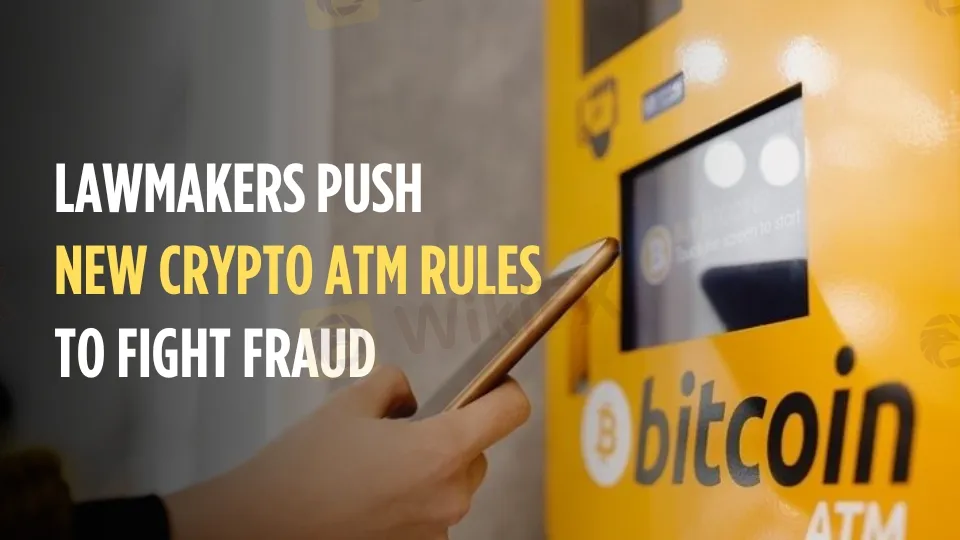Abstract:State bills impose crypto ATM regulations, limit transactions, cap fees, and fight scams costing billions, targeting fraud and consumer protection.

Across the United States, a bipartisan wave of state politicians is introducing legislation to strengthen control of cryptocurrency ATMs—automated teller machines that dispense Bitcoin and other digital currencies. These measures try to stem the rising flow of cryptocurrency frauds, which have sucked billions from unwary Americans, while also balancing consumer access to this expanding financial frontier. With scores of measures introduced in at least 15 states, the goal is clear: regulate crypto ATMs, safeguard customers, and prevent fraudsters from abusing these devices.
The proposed legislation takes a multipronged approach to crypto ATM regulation. Most laws require operators to register with state authorities, a step intended to increase accountability to a business that opponents claim operates in a regulatory gray area. Along with registration, lawmakers want big consumer warnings placed on ATMs, exposing customers to the volatility and hazards associated with cryptocurrencies—alternative investments that can rise or plunge overnight. Another important requirement is the availability of live customer care representatives, who can provide consumers with real-time assistance as they navigate these often-confusing procedures.
To further protect customers, the Act imposes severe restrictions on daily transaction amounts and costs. In many jurisdictions, cryptocurrency ATM users would be limited to $1,000 per day, however some legislation, like one in Maryland, would raise that limit to $2,000. Fee limitations are also being discussed, with options ranging from a flat $5 to a percentage-based ceiling of 3% to 15% per transaction. These limitations are intended to dissuade scammers who rely on high-value transfers and expensive fees to maximize their profits while ensuring that crypto ATMs remain viable for real customers.
The urgency of these laws derives from a rapid increase in Bitcoin fraud. The FBI estimated in September that crypto frauds will cost Americans $5.6 billion in 2023, a whopping 45% increase from the previous year. Maryland Senator Pamela Beidle, a Democrat who is sponsoring one such measure, underlined the human toll. “People are losing their savings,” she added, referring not to the process of buying cryptocurrency at ATMs, but to schemes that urge victims to transmit payments to fraudulent third parties. Her proposed law, which will be updated soon, will prohibit transactions at $2,000 per day, limit fees to $5 or 15%, and compel operators to collect user data for enhanced protection.

Beidle provided a sobering example from her district: a constituent lost $3,500 after a fraudster posing as a Baltimore County Sheriff's Office official told him he had missed grand jury duty. Spoofed phone numbers gave the ruse credence, while a Bitcoin ATM aided the crime. Such stories reverberate across the country, boosting legislative momentum.
A law in North Dakota that would restrict payments to $2,000 for a user's first five transactions has already passed the state House. Similar ideas have advanced through committees in Arizona and Hawaii, while variants are being debated in Colorado, Connecticut, Florida, Illinois, Iowa, Massachusetts, Oklahoma, Rhode Island, Texas, and Washington. New Jersey, on the other hand, has taken the harshest approach, proposing an outright ban on crypto ATMs, with fines of up to $10,000 for first-time offenders—a move that industry proponents say might hinder innovation.
Law enforcement supports these efforts, with officials such as Westerly, Rhode Island Police Chief Paul Gingerella attesting to the rising weight of cryptocurrency-related crime. “Criminals are exploiting unregulated and loosely monitored virtual currency ATMs to facilitate illicit transactions, launder money, and defraud residents,” he said, warning that operators frequently obstruct investigations. Senator Victoria Gu of Rhode Island supports a measure that includes quarterly reporting requirements and risk warnings. Gu warns, “Crypto ATMs are unfortunately an increasingly common way for criminals to get away with their ill-gotten gains.”
The AARP has also backed these regulations, pointing out that older adults—nearly half of the 5,500 FBI-reported crypto ATM fraud victims in 2023—bear the brunt of these schemes. Meanwhile, states such as Florida, Illinois, and Massachusetts are looking at blockchain analytics to prevent fraud, while Colorado's bill provides reimbursements to victims of proven schemes.
The cryptocurrency business, valued at $3.3 trillion globally by Forbes, continues to enthrall Americans. According to a Pew Research Center poll, one out of every six people has experimented with cryptocurrency, with younger males (42% of those under 30) leading the way. Bitcoin's stunning ascent to over $100,000 has further fueled interest—and fraudulent activity, which Chainalysis believes is growing 24% per year.
Industry experts, like as Peter Herzog of the Crypto Council for Innovation, advocate collaboration over confrontation. “It's critical that policymakers work with industry early,” Herzog said, warning that New Jersey's prohibition might disrupt markets and prevent average consumers from accessing their assets. He calls for a balanced approach that protects access while combating fraud.
Only a few states, such as Vermont, have adopted crypto ATM legislation to date. Others, notably Pennsylvania and Connecticut, contend that current ATM standards do not apply, resulting in a patchwork of control. As these laws move, they represent a watershed moment in the battle against cryptocurrency frauds, potentially redefining how Americans interact with the digital currency ATMs that are cropping up in convenience shops and gas stations around the country.











